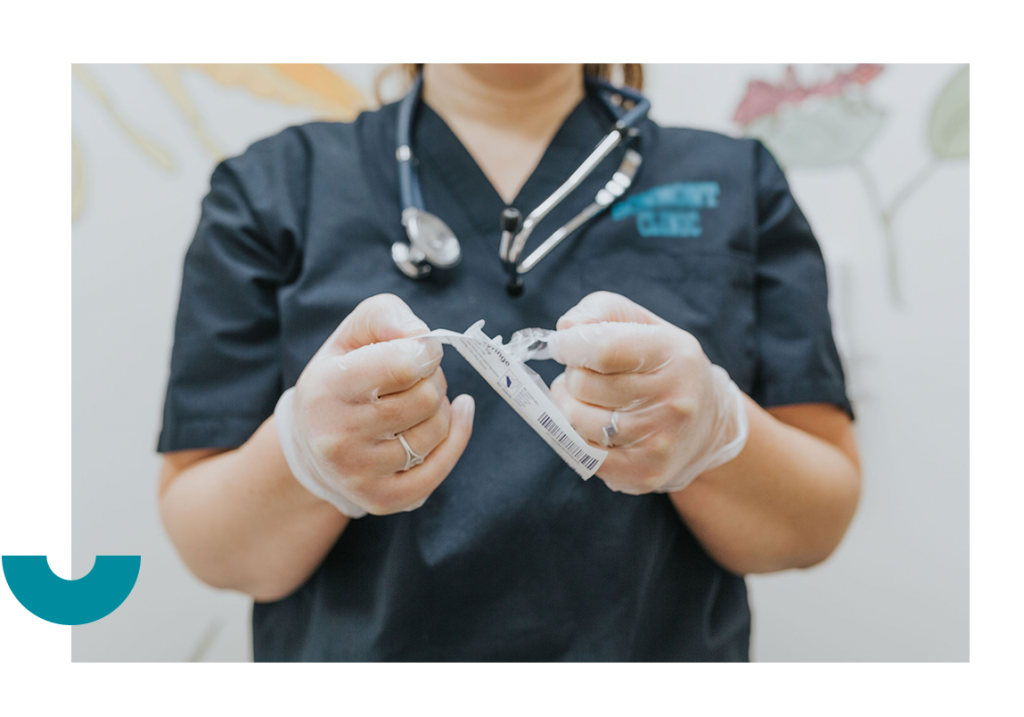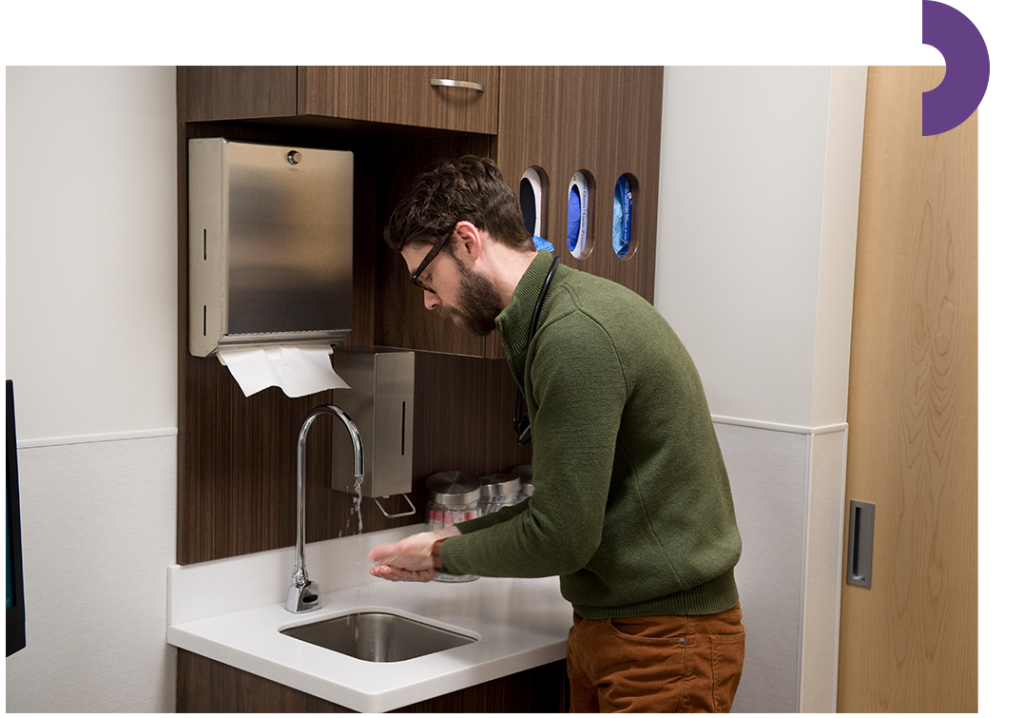IPAC requirements for clinics
Our requirements help clinic staff understand their basic obligations around things like:
- hand hygiene
- personal protective equipment
- managing medical sharps
- cleaning and disinfection
- and more
Our requirements are aligned with Canadian and Albertan legislation and policy. We frequently review them to make sure we meet other IPAC best practices.

Medical Device Reprocessing requirements for clinics
Does your clinic sterilize reusable medical devices onsite?
Committee opportunity for a physician with expertise in cosmetic and esthetic medicine
Are you a physician with a clinical focus on esthetics, cosmetic dermatology and cosmetic medicine? If so, consider an active role in profession-led governance by joining the IPAC Advisory Committee.
Guidance for clinics
These useful guidance documents can help your clinic meet best practices on some elements not covered in CPSA’s IPAC requirements. We recommend reviewing and sharing them with your clinic team regularly to stay up-to-date.
Preventing Transmission of Respiratory Infection in Community Medical Clinics
This guidance is intended to support regulated members and medical clinic staff in mitigating risks of respiratory infection transmission in clinic settings. This guidance should be used in conjunction with CPSA’s Infection Prevention and Control Requirements for Medical Clinics.
Hand hygiene
Hand hygiene is the most effective way of preventing the spread of infection to patients, staff or clinic visitors. Your clinic hand hygiene program should include training and education on policies, procedures and practices, and should be reviewed regularly.
Renovating or building a new clinic
When you renovate your clinic or build a new one, you should meet local, Albertan and Canadian regulations. We’ve created some suggestions for leasing, renovating or building new clinics.
Medication & vaccine injection safety
Proper technique and basic IPAC practices around handling vaccines, medications and injections can prevent the transmission of blood-borne viruses and pathogens in routine clinical procedures.
Autologous PRP in clinics
There are a number of IPAC risks with platelet-rich plasma (PRP) therapy. Physicians who offer PRP in their community medical clinic should take extra care to make sure their technique and products are sterile. CPSA has a number of recommendations to help ensure this therapy is provided safely.
Animals in medical clinics
There are situations when patients may benefit from animal interactions or when medical clinics may want to keep small animals in the clinic while patients are present. This guidance describes how animal interactions can be safely facilitated in clinical settings.
Point-of-care testing guidance
These guidelines are for non-laboratory healthcare providers who operate outside the auspices of Alberta Health Services and who use or rely on point-of-care laboratory testing (POCT) for their patients. This includes the use of POCT in clinical practice or office settings, occupational medicine clinics, pharmacies and private long-term care facilities.
Tools and resources for your clinic
Build your clinic policies and procedures
Under our IPAC requirements, every community clinic needs to have written IPAC policies and procedures that they regularly update. You can start developing your own by using our helpful template. We recommend customizing your own policies and procedures so they reflect your unique clinic practices.
Learn about IPAC core competencies
All staff members in your medical clinic should have basic IPAC skills and knowledge. Public Health Ontario offers a suite of online courses for both medical and non-medical staff aimed at helping learners to understand IPAC principles an improve staff and patient safety.
Review Alberta Health Services’ IPAC resources
Resource manuals and best practice recommendations from AHS to help with outbreak identification and management, IPAC education, guideline, policy and procedure development and more.
Can I prepare my own compounds for allergy testing and immunotherapy?
Physicians can only prepare their own compounds (e.g., allergy shots, sub-lingual serums) with approval from CPSA. To learn more about the compounding approval process, please contact CPSA’s Infection Prevention and Control program at (780) 969-5001 or ipac@cpsa.ab.ca.
Compounds made for subdermal and intradermal injections are required to be sterile and must be compounded in a location that meets the National Association of Pharmacy Regulatory Authorities (NAPRA) requirements. NAPRA standards must also be met to compound sublingual serums safely.
CPSA advises all physicians to obtain compounded products from an approved location, such as a compounding pharmacy or a regulated and routinely monitored commercial facility.
Can skin prick testing needles ever be reused during an allergy test?
As a rule of thumb, a needle must never be reused. After each prick or scratch of the skin, the needle(s) need to be safely discarded. Never place a used needle back into an allergen well. Wiping off a needle between uses is ineffective at removing germs, increases the likelihood of a needlestick injury and can negatively impact the accuracy of testing.
How can I keep allergen products safe during and after an allergy test?
- Always protect the bulk supply of allergen from contamination. Needles and droppers that have contacted the patient’s skin should never go back (i.e., “double-dip”) into a well or vial.
- Avoid any “topping up” of allergen in wells when amounts are low. Instead of mixing new allergen product with old, discard the well or tray and use a new one.
- Follow the instructions set out by the allergen manufacturer regarding handling, storage, refrigeration and re-use after opening and expiry of the allergen product.
Is it safe to use the skin drop / dropper method during an allergy test?
Yes. The goal should be to drop the allergen onto skin without the dropper touching skin. If the dropper touches the patient’s skin, it cannot be placed back into a well of allergen as this contaminates the supply. Once the drop has been placed on the skin, use only new, sterile needles to scratch the skin. Safely discard the needle after each scratch.
What is compounding?
Compounding is the combining, or mixing together, of two or more ingredients (of which at least one is a drug or pharmacologically active component) to create a final product in an appropriate form for dosing. It can involve raw materials or the alteration of the form and strength of commercially available products. Compounding also includes the process of reformulating a drug for a for a new therapeutic/medical use.
Compounding does not include mixing, reconstituting or any other manipulation that is performed in accordance with the directions on an approved drug’s label. (Source)
What is the safest way to perform skin prick testing during an allergy test?
Multi-needle medical devices (e.g., spider-like plastic frames with eight small needles attached) are a safe, effective and efficient way to deliver testing. If single needles are used, a new, sterile needle is required for every skin prick or scratch. Discard any needle(s) after contact with a patient. Medical devices used for skin prick testing must have validated instructions for use and a medical device licence from Health Canada.
Additional IPAC resources
All ResourcesBlood and Body Fluid Precautions
Click to view filesInfection Prevention & Control Requirements for Medical Clinics
CPSA Click to view filesInfection prevention and control (IPAC) requirements
CPSA Click to view filesOffsite Reprocessing of Medical Devices
CPSA Click to view filesRenovating or developing new clinical office space
CPSA Click to view filesInformation for Albertans
All of Alberta’s medical clinics must meet strict infection prevention and control requirements. CPSA routinely assesses clinics for medical device reprocessing. If you see a CPSA certificate in your community’s medical clinic, it means they’ve been assessed under our MDR requirements.
If you have a question or concern about how your clinic meets our MDR or IPAC requirements, reach out to us using the contact form below.

Questions or feedback? We'd love to hear from you.
Phone: 780-969-5004
Toll-free: 1-800-561-3899 ext. 5004 (in Canada)
Fax: 780-424-5859




















